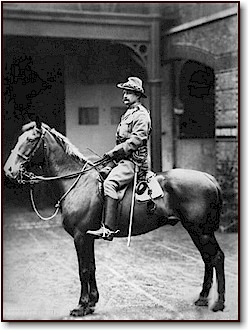|
|||||||
| 0505 COLONEL TOM PRICE
He was born on 21st October, 1842 at Hobart, Tasmania, the son of John Price, who himself was very famous in Australia’s early history, not as a soldier but as a prison administrator. Young Thomas gained an early education in Hobart and then in 1854 moved to Scotch College Melbourne and from there to a military college in England. In 1861, he was commissioned in the Madras Infantry. He served in India till 1883, when he retired with the rank of lieutenant colonel and returned to Australia to undertake farming at Heidelberg in Victoria. He organized a number of rifle clubs in Victoria (how different was the climate for such things from today!) and came under the notice of Sir Frederick Thomas Sargood, the then Victorian Minister for Defence. Price was appointed in 1885 to form and command the Victorian Mounted Rifles, (afterwards known as the Light Horse), and continued on, inter alia, with the spread of the rifle club movement. One other enduring legacy of his influence was the design and adoption of the slouch hat, as mentioned in the February Journal. A vigorous, outspoken and somewhat fiery personality, he created many admirers and more than a few enemies, but is readily acknowledged as the father of the mounted rifles in Australia. A time to put theory into practice came when Price was appointed to lead the Second Victorian Rifles Contingent to South Africa in 1900. He and his men were engaged in a number of actions in the Orange Free State and the Transvaal. He was mentioned in dispatches in 1901, previously being created a CB (Companion of the Bath) in 1900. Upon his return, he was appointed as the commander of the Commonwealth Military Forces in Victoria and was appointed to the corresponding command in Queensland in July, 1902. He retired from the army in 1904 and lived out the rest of his days at Warnambool in Victoria. His health, unfortunately, had been impaired by his service in India and South Africa and he passed away on 3rd July, 1911.
|
|||||||
|
 One
of the outstanding military figures in Australia
around the time of Federation was Thomas Caradoc
Rose Price (1842-1911), who was generally known as
Colonel Tom Price.
One
of the outstanding military figures in Australia
around the time of Federation was Thomas Caradoc
Rose Price (1842-1911), who was generally known as
Colonel Tom Price.